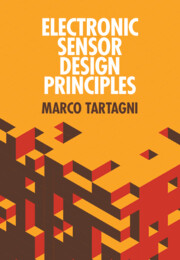Book contents
- Electronic Sensor Design Principles
- Electronic Sensor Design Principles
- Copyright page
- Dedication
- Contents
- Preface
- Part I Fundamentals
- Part II Noise and Electronic Interfaces
- Part III Selected Topics on Physics of Transduction
- 9 Selected Topics on Photon Transduction
- 10 Selected Topics on Ionic–Electronic Transduction
- 11 Selected Topics on Mechanical and Thermal Transduction
- Part IV Problems and Solutions
- Index
- References
11 - Selected Topics on Mechanical and Thermal Transduction
from Part III - Selected Topics on Physics of Transduction
Published online by Cambridge University Press: 23 December 2021
- Electronic Sensor Design Principles
- Electronic Sensor Design Principles
- Copyright page
- Dedication
- Contents
- Preface
- Part I Fundamentals
- Part II Noise and Electronic Interfaces
- Part III Selected Topics on Physics of Transduction
- 9 Selected Topics on Photon Transduction
- 10 Selected Topics on Ionic–Electronic Transduction
- 11 Selected Topics on Mechanical and Thermal Transduction
- Part IV Problems and Solutions
- Index
- References
Summary
This chapter is focused on the concepts of mechanical and thermal transduction related to the change of conductance and polarization in materials. Therefore, after an introduction on basic concepts, the transduction processes of piezoresistivity, piezoelectricity, and temperature effects on resistance are discussed. Finally, examples of applications of resistance sensors are given, focusing on some techniques to reduce errors due to influence variables.
Keywords
Information
- Type
- Chapter
- Information
- Electronic Sensor Design Principles , pp. 544 - 594Publisher: Cambridge University PressPrint publication year: 2022
